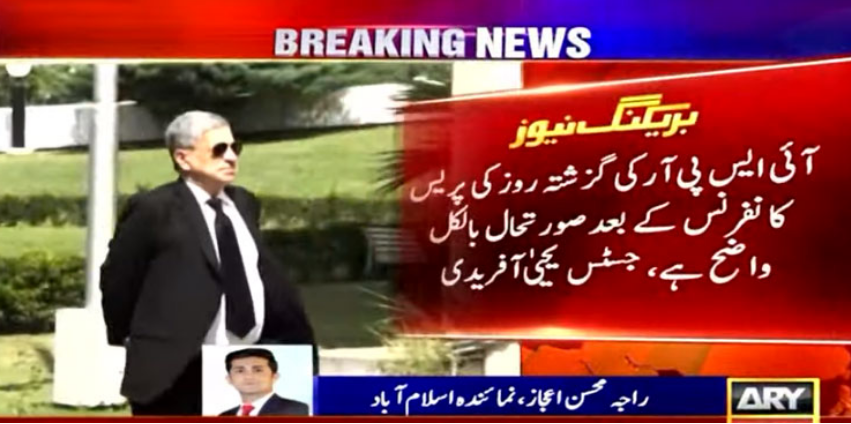No civilian under trial in military courts, AGP tells SC

According to ARY News, the Supreme Court resumed hearing appeals against military court trials of civilians on Tuesday.
There are five judges on the bench headed by Chief Justice Umar Ata Bandial: Justice Ijazul Ahsan, Justice Munib Akhtar, Justice Yahya Afridi, Justice Mazahir Ali Akbar Naqvi, and Justice Ayisha Malik.
AGP Mansoor Usman Awan told the apex court that military courts do not currently try civilians.
In response to Chief Justice of Pakistan Umar Ata Bandial’s request that the AGP “reassure” him that such a trial would not happen if the case was heard in court, the AGP said that the case would be heard in court.
In accordance with AGP, no trials of civilians are currently underway.
A court-martial cannot be issued against civilians, according to Imran Khan’s lawyer, Uzair Bhandari. He said that 102 people will face military trials yesterday, according to ISPR Director General spokesperson Maj Gen Ahmed Sharif Chaudhry.
Attorney-General for Pakistan (AGP) Mansoor Usman Awan interrupted and said, “I stand by the statement I made yesterday.”
While proceedings are ongoing, CJP Bandial hopes no military trials of civilians will take place. A meeting with the families of the 102 prisoners should be possible, he said.
One of the petitioners was Jawwad S. Khawaja, who was related to Justice Mansoor Ali Shah. By noting that the court was already aware of this fact at the beginning of the proceedings, Justice Shah rescued himself from the situation.
Appeals against military courts resume with new bench in the SC
The bench was dissolved for the second time. Qazi Faez Isa, with Justice Sardar Tariq Masood’s support, had earlier said he did not consider the SC bench a “proper court”.
PTI chief’s lawyer, Hamid Khan, said the petition has not yet been assigned a number, adding, “One of our pleas relates to a military court.”
According to CJP Bandial, you should amend your petition, since you have made several arguments. According to Hamid Khan, he would only address military courts. “We’ll investigate later,” replied CJP. There is no point in executing different ploys instead of the constitution or law, these practices will serve no purpose,” he said.
Khawaja presented his written contentions in court on behalf of the former chief justice.
Junaid Razzaque’s attorney, Salman Akram Raja, stated in his arguments that the case had been in military court for some time. An Article 175 trial can only be conducted by a judge, according to the counsel.
According to the lawyer, the FPLE decision did not clearly define the division of powers. In her question, Justice Ayisha Malik asked what was the relevance of the FPLE case to this case. During his earlier question, Justice Malik reiterated his concern about section 2 of the Army Act. Even military court martials could not be held in military courts, Justice Munib Akhtar said. According to the lawyer, military officers’ trials are conducted in military courts under specific conditions in the UK and the US.
The Supreme Court is not allowed to hear constitutional petitions related to military courts, Justice Munib questioned. In his statement, Slman Akram Raja said that the high court could not determine the position of military courts.
Judge Munib Akhtar asked, “Are you arguing that a court martial could not be held even against military officials?” According to lawyer Salman Akram Raja, the constitution does not distinguish between civilians and military officials.
“Whether a trial has been started for anyone. Whenever they begin, it should happen this way or that way,” CJP explained. The counsel replied, “No one has yet been tried in military court.”.
CJP said that civilian rights should not be curtailed in your case. It is important not to lead the case to further complications, he said.
Further, Salman Akram Raja argued that the case can be handled in a special court if constitutional rights will not be affected. According to him, trials in banking courts or ATC have no impact on constitutional rights.
In your statement, you link clause 3 of Article 175 with basic human rights,” the CJP said. Thus, it will be applicable to military courts, the chief justice said.
‘Article 175’s clause 3 becomes effective when Article 9 and 10 guarantee fair trials,’ counsel said. Transparency in trials cannot be denied to anyone, he added.
“Show us a court reference demonstrating how Article 175 relates to the Military Act,” CJP asked.
According to Justice Ayisha Malik, the FBLE case was related to retired soldiers’ relationship with the military, and it has no relevance to the present case. It is possible to have a civil trial in a military court. The Army Act has been challenged by you without providing reasons,” Justice Malik said.
The Supreme Court has established the principle that judicial matters can be handled by the judiciary, according to Salman Akram Raja.
“There are various rulings about military courts, what you are talking about supports military men, we are simple people, tell us in simple words,” chief justice said.
In his statement, the lawyer said, “I am only referring to the civilians’ trial in military courts.” “If you can deny fundamental rights to civilians, then tell us why,” CJP replied. According to the lawyer, “No one can be denied fair trial simply for making an allegation.”.
